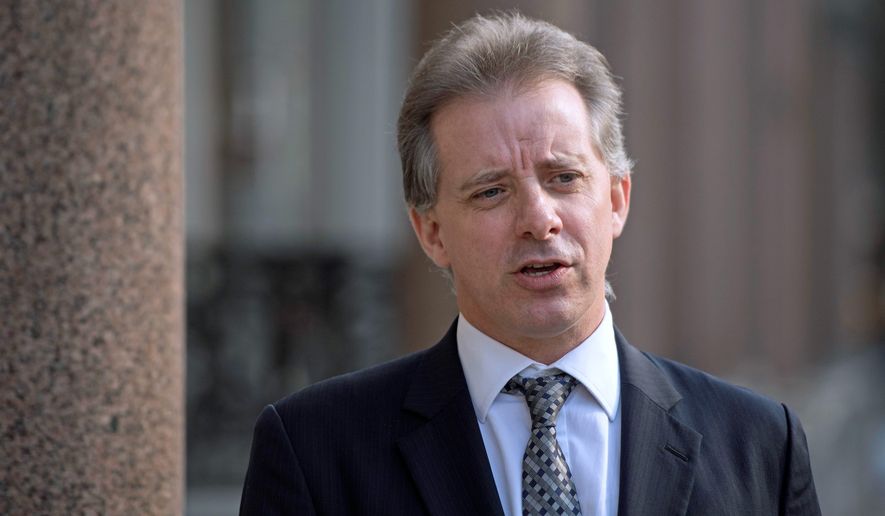A new legal fight erupted in a two-year-old libel case between BuzzFeed and a Russian entrepreneur that could delay this week’s scheduled release of anti-Trump dossier creator Christopher Steele’s deposition transcript.
The Russian entrepreneur — Aleksej Gubarev, who heads the tech firm XBT Holdings — wants a federal appeals court to issue an emergency order to delay the public release of documents in his dismissed libel lawsuit against BuzzFeed.
On Tuesday, the appeals court denied the Gubarev request, meaning the case file will be made public on Thursday.
The news website attempted to “dirty up” Mr. Gubarev by filing unproven gossip about his personal life that shouldn’t be released, his lawyers argue.
Mr. Gubarev is appealing to the U.S. Court of Appeals for the 11th Circuit to overturn the dismissal of his lawsuit. U.S. District Judge Ursula Ungaro in Florida dismissed the case in December and followed up her decision with a Feb. 28 blanket order to unseal the entire case file on Thursday.
In January 2017, BuzzFeed published Mr. Steele’s Democratic Party-financed dossier that accused Mr. Gubarev, without evidence, of hacking party computers under duress from Russian intelligence.
The court file includes a deposition of Mr. Steele, a British ex-spy, taken by Gubarev attorney Val Gurvits and others in London. Also deposed was David Kramer, a former associate of the late Sen. John McCain.
Mr. Kramer leaked the 35-page dossier to BuzzFeed. His deposition may shed more light on the role of McCain, who hand-delivered the document to then-FBI Director James B. Comey in December 2016.
Mr. Gurvits’ argument to delay the unsealing is that BuzzFeed attorneys filed all sorts of extraneous tidbits about Mr. Gubarev and his company that have nothing to do with the dossier’s truth.
“Having been unable to find any relevant evidence proving the truth of the defamatory statements that they published concerning Plaintiffs (despite having spent more than [money figure redacted] on a team of former FBI agents in an attempt to do so), Plaintiffs took a new tack by attempting to flood the District Court docket with every irrelevant, but potentially-damaging bit of information they could,” Mr. Gubarev’s legal team told the appeals court.
The unsealing, Mr. Gurvits argues, would disclose “confidential and proprietary financial information; private information concerning Mr. Gubarev and his family members; and every bit of salacious material their former FBI agents managed to uncover, regardless of how irrelevant and unreliable such information proved to be.”
Mr. Gubarev’s attorneys criticized Judge Ungaro, saying she ordered the release “without proper regard for the need or consequences of such an order. In doing so, the District Court committed an abuse of discretion.”
The attorneys accused the judge of “blatant victim-blaming [that] is unseemly and unsupported by the relevant case law.”
Judge Ungaro dismissed the Russian’s defamation lawsuit, not because she found the dossier true, but because the FBI relied on it to investigate the Trump campaign. That made it fair reporting privilege, she said.
Mr. Gubarev immediately denied the dossier charges and quickly filed libel lawsuits in Florida against BuzzFeed and in London against Mr. Steele. The London case is scheduled to go to trial this fall.
How inaccurate was Mr. Steele’s charge against Mr. Gubarev? The actual computer hacking was done by Russian intelligence, says an indictment brought by special counsel Robert Mueller. The indictment makes no mention of any other players.
The Mueller team hasn’t attempted to contact Mr. Gubarev, his lawyers say.
The New York Times on Monday filed an argument asking the appeals court to reject a delay. It was the Times’ intervention that prompted Judge Ungaro to order court file to be unsealed.
BuzzFeed filed its argument under seal on Monday.
Mr. Gurvits told The Washington Times: “Plaintiffs are not interested in keeping Mr. Steele’s transcript confidential.”
• Rowan Scarborough can be reached at rscarborough@washingtontimes.com.




Please read our comment policy before commenting.